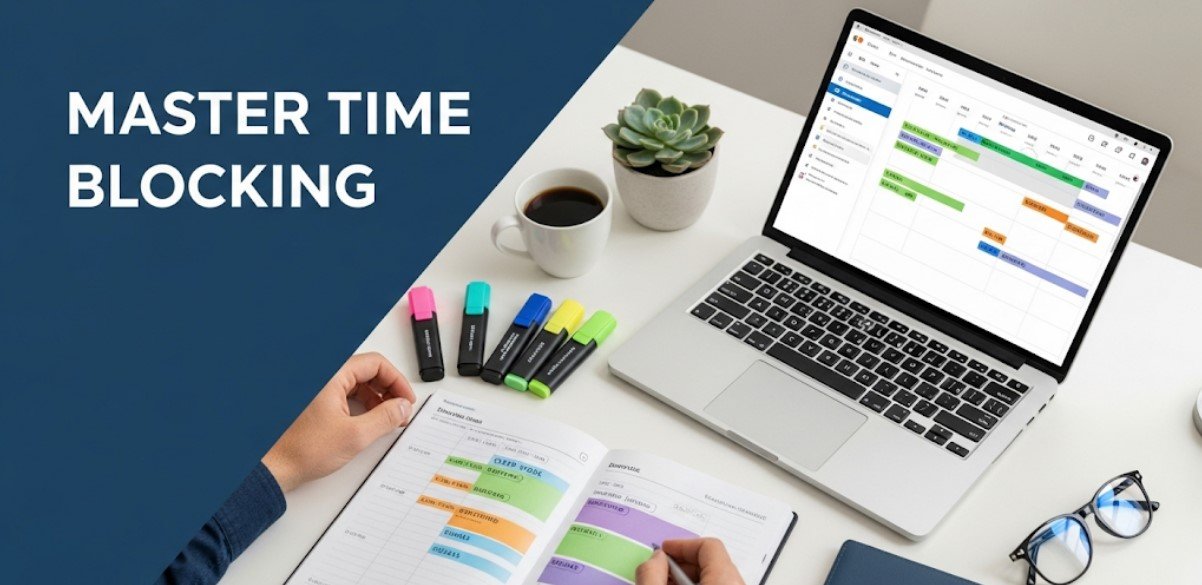If you’ve ever sat down to study and ended up deep in a YouTube rabbit hole, you’re not alone. As students, our biggest enemy isn’t just tough assignments—it’s time slipping through our fingers. Imagine your day as a jar. Every hour is a marble. If you spend them without care, the jar empties before you’ve done anything meaningful. That’s why these game-changing productivity hacks for students aren’t just “nice-to-have tips.” They are the keys to reclaiming your time, boosting focus, and still having space for the things you love—whether it’s gaming, hanging out with friends, or binge-watching your favorite series guilt-free.
In this guide, we’ll cover 20 proven, science-backed strategies that go beyond the usual “study hard” advice. You’ll learn how to work with your brain’s natural rhythm, manage distractions, and create systems that make success almost automatic.
1. Eliminate Distractions Before They Eliminate Your Focus
Think of your brain like a computer. Every notification, background noise, or tempting social media app is like opening another tab—it slows you down. Studies show that even a small distraction can take 23 minutes to fully recover from. So, before you start studying, audit your environment. Turn off phone notifications, use website blockers, and let friends or family know you need quiet time.
A personal trick I use? I put my phone in another room. It sounds dramatic, but it works. Out of sight, out of mind. For digital distractions, apps like Freedom or Cold Turkey can lock you out of time-wasting websites. And if you’re studying in a noisy place, noise-canceling headphones or a “brown noise” playlist can do wonders.
The point isn’t to have monk-like silence forever—it’s to create windows of deep focus where your brain can give its best. That’s when real productivity magic happens.
2. Take Breaks to Boost Brain Power

Here’s the paradox: working non-stop doesn’t make you more productive—it makes you slower. Your brain works best in sprints, not marathons. Without breaks, your focus drops, mistakes creep in, and tasks take longer.
The secret is active rest. Instead of scrolling on your phone, step outside, stretch, or make a cup of tea. This gives your brain the oxygen and blood flow it needs to stay sharp. The Pomodoro Technique (we’ll get to this later) is a great way to build breaks into your study schedule.
I used to feel guilty about taking breaks, but then I realized: the best athletes rest between sets. Why shouldn’t students do the same? Breaks aren’t laziness—they’re maintenance for your mind.
3. Set Clear and Measurable Goals
Saying “I’m going to study” is like saying “I’m going to travel somewhere.” You need a destination. Vague goals lead to vague results. Instead, aim for specific, measurable targets. For example:
-
“Finish reading chapter 4 by 3 PM”
-
“Write 500 words of my essay before lunch”
A written goal is like a contract with yourself. Put it on sticky notes, a planner, or a digital app like Todoist. And here’s the kicker—write it in a way that tells you when you’ve won. “Read for an hour” is better than “Read more,” because it has a finish line.
When you wake up knowing exactly what you’re aiming for, you waste less time deciding what to do and spend more time actually doing it.
4. Prioritize Like a Pro
Not all tasks are created equal. Spending an hour choosing a font for your presentation is not the same as writing the actual content. This is where prioritization comes in.
A method I swear by is the Eisenhower Box. It splits your tasks into four categories:
| Urgent | Not Urgent |
|---|---|
| Important → Do it now | Schedule it |
| Not Important → Delegate it | Delete it |
Ask yourself: Is this task urgent? Is it important? If it’s neither, cut it out. If it’s important but not urgent, schedule it before it becomes urgent.
When you stop treating every task like it’s top priority, you make room for the work that actually moves you forward.
5. Master Time Blocking

If your day feels like it’s slipping away, time blocking is your rescue boat. This method involves assigning a specific time slot to each task, just like a school timetable. Instead of saying “I’ll study sometime today,” you say “Math from 2–3 PM, history essay from 3–4 PM.”
It works because it turns your to-do list into an actual plan. Tools like Google Calendar or Notion make it easy, but you can also do it on paper. Just be realistic—don’t cram 10 hours of work into a 6-hour window.
Here’s a personal twist: I always leave “buffer blocks” for unexpected delays. That way, if something takes longer, my whole day doesn’t collapse.
6. Use Productivity Apps Wisely
Technology can either be your biggest distraction or your greatest ally. The trick is choosing apps that help you stay focused rather than pull you away.
Some great examples for students:
-
Notion – All-in-one workspace for notes, tasks, and schedules
-
Forest – Grow virtual trees by staying off your phone
-
Todoist – Simple and powerful task manager
-
Trello – Visual boards for tracking assignments
But here’s the golden rule: Don’t spend more time setting up productivity apps than actually doing the work. The app is the tool—not the work itself.
7. Keep a Do-List, Not Just a To-Do List
This sounds strange, but hear me out. A to-do list shows what you plan to do. A do-list is a record of what you actually did. Why is this powerful? Because it keeps you honest.
At the end of the day, writing down completed tasks gives you a sense of progress. It’s also a reality check—if your to-do list is full but your do-list is empty, something’s wrong.
You can keep it simple: just jot down the date and everything you accomplish, big or small. Over time, you’ll see patterns—maybe you work better in the morning, or maybe certain tasks always take longer than expected.
8. Get Enough Sleep—Your Brain Depends on It
Pulling all-nighters feels heroic until you realize your memory and focus are wrecked the next day. Sleep isn’t just “rest”—it’s when your brain files and stores information. Without it, you’re trying to run a marathon on no fuel.
Aim for 7–9 hours of quality sleep. That means winding down before bed, avoiding screens an hour before sleep, and keeping your room cool and dark. If you can, go to bed and wake up at the same time every day—yes, even on weekends.
Think of sleep as your brain’s “save” button. Without it, everything you studied might not stick.
9. Avoid Multitasking Like the Plague
Multitasking feels productive, but research shows it actually makes you less efficient. Switching between tasks forces your brain to constantly refocus, which burns more energy and time.
Instead, try single-tasking. Pick one thing, set a timer, and give it your full attention. When it’s done, move to the next. You’ll notice tasks get finished faster and with fewer mistakes.
If you absolutely must handle multiple things, batch similar tasks together. Reply to all emails in one block instead of scattering them through the day. This keeps your brain in the same “mode” and reduces cognitive strain.
10. Create a Routine That Works for You
Routines aren’t about being boring—they’re about removing decision fatigue. When you know exactly when you’ll study, eat, or exercise, you save mental energy for the stuff that matters.
Start by anchoring your day with consistent wake-up and sleep times. Then, set study hours when you’re most alert—morning for early birds, night for night owls. Include time for breaks, exercise, and hobbies so you don’t burn out.
Think of your routine as a playlist for your day. Once you press play, the rhythm carries you along without having to constantly choose the next song.
11. Try the Pomodoro Technique for Laser Focus
When your brain resists starting a task, break it down into short bursts. The Pomodoro Technique is a simple but powerful method: work for 25 minutes, then take a 5-minute break. After four sessions, take a longer break of 15–30 minutes.
Why it works: 25 minutes feels manageable, so you start without dread. The ticking timer also creates urgency, helping you stay focused. And those short breaks keep your brain from hitting burnout mode.
I like to pair this with a timer app like Focus Booster, but you can just use your phone (in airplane mode). Over time, you’ll notice you get more done in two Pomodoros than in an unfocused two-hour block.
12. Reward Yourself for Small Wins
Your brain loves rewards—it’s wired for them. The trick is to use them as motivation boosters instead of distractions. Finish a chapter? Treat yourself to a snack. Submit that essay? Watch an episode of your favorite show.
Make sure the reward is proportional. You don’t need to binge-watch three seasons for finishing a worksheet. Small, consistent rewards train your brain to associate work with positive feelings, making you more likely to start again next time.
It’s like training a pet—you’re just training your own motivation system.
13. Allocate Time Based on Task Importance
Some students spend hours on low-value tasks while rushing through important ones. This happens when we don’t match our energy levels to the right tasks.
If you’re most alert in the morning, tackle your hardest subject first. Use the “2-2-2 method”:
-
2 hours for high-focus work
-
2 hours for moderate tasks
-
2 hours for light or repetitive work
This way, your energy is used efficiently, and you avoid that dreaded end-of-day panic where the big assignment is still untouched.
14. Batch Similar Tasks Together
Task-switching is a productivity killer. Instead of jumping between unrelated tasks, group similar work into one session. This could mean answering all emails at once, doing all math problems in a single block, or writing all discussion posts together.
Why it works: Your brain gets into a specific “mode” for each type of task. Batching lets you ride that momentum instead of resetting your focus every five minutes.
This is especially powerful for admin work—things like scanning notes, organizing files, or updating your calendar.
15. Collaborate and Study in Groups

Studying with the right people can speed up learning and keep you accountable. The key is “the right people”—those who are focused, supportive, and not going to derail you with gossip.
Group study is great for:
-
Sharing different perspectives on a topic
-
Teaching each other (which deepens understanding)
-
Keeping morale high during stressful exam weeks
Set clear goals for the session and assign roles (note-taker, presenter, timekeeper) to avoid chaos.
16. Delegate Tasks Where Possible
You can’t delegate your own studying, but you can free up time by delegating other responsibilities. For example, if you live with roommates or family, share chores fairly so you’re not stuck doing it all during exam week.
If you’re part of a group project, divide the work according to strengths. This isn’t about being lazy—it’s about efficiency. Everyone benefits when tasks are distributed in a way that maximizes each person’s skill set.
17. Use the Eisenhower Box to Decide Faster
Earlier, we touched on prioritization, but the Eisenhower Box deserves its own spotlight because it’s so powerful. It helps you stop wasting time on low-value tasks by giving a clear decision path:
-
Do it now – Urgent & important
-
Schedule it – Important but not urgent
-
Delegate it – Urgent but not important
-
Delete it – Neither urgent nor important
When you feel overwhelmed, just drop your tasks into one of these four boxes. Suddenly, your day looks a lot more manageable.
18. Listen to Music That Boosts Concentration
The right music can help you tune out distractions and get into flow. Classical, lo-fi beats, or instrumental movie soundtracks are great options because they don’t have distracting lyrics.
Personally, I use a “study soundtrack” playlist—songs I only listen to while working. This tricks my brain into knowing it’s “focus time” whenever that playlist starts.
Just avoid songs you want to sing along to—unless your goal is karaoke practice, not studying.
19. Manage Emails Like a Pro
Emails are sneaky time thieves. If you check them constantly, they interrupt your flow and break concentration. Instead, set specific times to check and respond—maybe once in the morning, once after lunch, and once before wrapping up the day.
Use labels or folders to organize messages. Unsubscribe from newsletters you never read. And remember—not every email needs an instant reply.
20. Work Near Natural Light
This one’s underrated but scientifically proven: natural light boosts energy, mood, and focus. It regulates your circadian rhythm, which means better sleep and more consistent energy levels.
If possible, study near a window during the day. If that’s not an option, use a daylight-mimicking lamp. Your brain will thank you, and your notes will feel less like a dungeon experience.
Quick Recap Table: 20 Game-Changing Productivity Hacks for Students
| # | Hack | Key Benefit |
|---|---|---|
| 1 | Eliminate distractions | Max focus & deep work |
| 2 | Take breaks | Prevent burnout |
| 3 | Set clear goals | Direction & motivation |
| 4 | Prioritize tasks | Work on what matters most |
| 5 | Time blocking | Structure & efficiency |
| 6 | Use productivity apps | Stay organized |
| 7 | Keep a do-list | Track real progress |
| 8 | Get enough sleep | Boost memory & focus |
| 9 | Avoid multitasking | Higher efficiency |
| 10 | Create a routine | Reduce decision fatigue |
| 11 | Pomodoro technique | Laser focus in short bursts |
| 12 | Reward yourself | Motivation boost |
| 13 | Allocate time wisely | Match energy to tasks |
| 14 | Batch tasks | Reduce mental strain |
| 15 | Collaborate & study groups | Faster learning |
| 16 | Delegate tasks | Free up time |
| 17 | Eisenhower Box | Faster decisions |
| 18 | Productive music | Focus & flow |
| 19 | Manage emails | Save time |
| 20 | Natural light | Energy & mood boost |
Final Thoughts: Making Productivity a Habit
The truth is, these game-changing productivity hacks for students aren’t magic tricks. They work because they’re rooted in how our brains naturally operate. The secret isn’t trying them all at once—it’s choosing two or three to start with, mastering them, and then adding more.
When productivity becomes a habit, studying stops feeling like a never-ending grind. You’ll get more done in less time, reduce stress, and still have space for fun and rest. That’s the real win.
FAQs on Game-Changing Productivity Hacks for Students
1. Which productivity hack should I start with first?
Start with eliminating distractions—it gives the fastest visible results.
2. Is multitasking ever good?
Only if the tasks are extremely simple and don’t require focus, like folding laundry while listening to a recorded lecture.
3. How much sleep do students really need?
Most need 7–9 hours for optimal performance and memory retention.
4. Can group study sessions be distracting?
Yes—choose group members carefully and set clear goals before starting.
5. Is the Pomodoro Technique suitable for everyone?
Not always. Some prefer longer focus sessions, but it’s a great place to start.
6. What’s the best music for studying?
Instrumental, lo-fi, or classical music without lyrics works best for focus.
7. How do I avoid procrastination?
Use a mix of goal-setting, time blocking, and small rewards to make starting easier.
8. Are productivity apps necessary?
Not necessary, but they can help you stay organized if used wisely.


